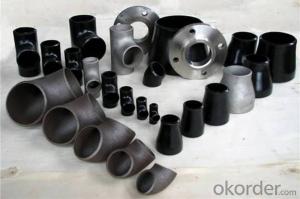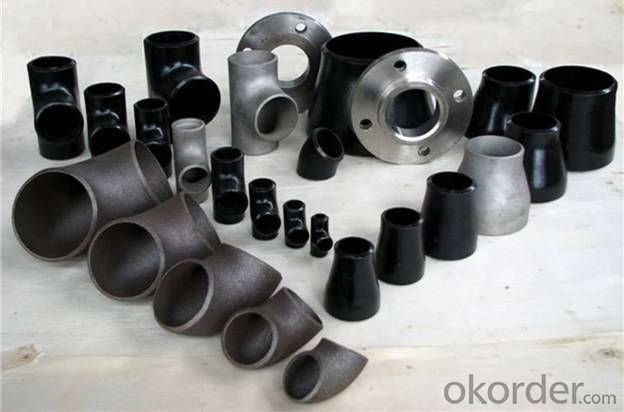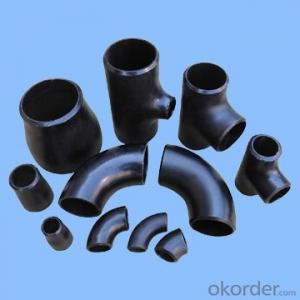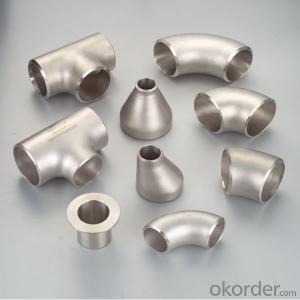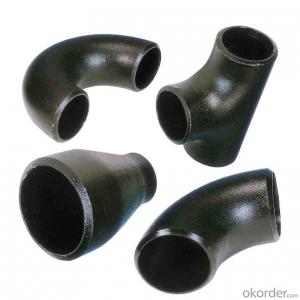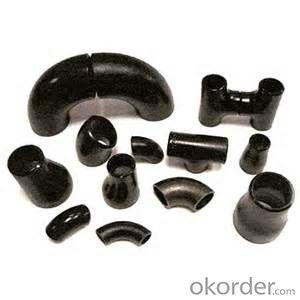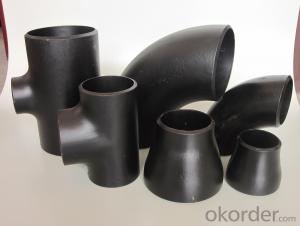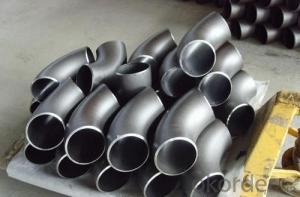4'' carbon steel pipe fittings ISO/ BS EN/DIN/ API
- Loading Port:
- Tianjin
- Payment Terms:
- TT OR LC
- Min Order Qty:
- 5 m.t
- Supply Capability:
- 300 m.t/month
OKorder Service Pledge
OKorder Financial Service
You Might Also Like
Products Detailed Description
Products | pipe fittings elbows, bends,tees, reducers caps |
Size | 1/2" - 48" |
Wall thickness | Sch5-Sch160 XXS |
Standard | ANSI, ASME API5L, OCT, DIN and JIS, etc. |
we can also produce according to drawing and standards provided by customers. | |
Material | Carbon steel, alloy steel and stainless steel. |
We can produce according to materials appointed by consumers. | |
Packaging | Plywood Cases,plywood pallet, plastic bag or as customers requirement |
Surface Treatment | Shot blasted, rust-proof black oil |
Delivery Time | 10-60 days |
Quality | First grade |
Others | 1.Special design available according to your drawing. |
2.anti-corrosion and high-temperature resistant with black painting | |
3. All the production process are made under the ISO9001:2000 strictly. | |
4. A conformity rate of ex-factory inspection of products. |
Specifications
Ansi B16.9 WPB carbon steel pipe fitting elbow tee reducer
Size:Seamless 1/2"-24" Welded 1/2"-48"
ANSI B16.9 WPB carbon steel pipe fitting elbow tee reducer
1.Size: Seamless 1/2"-24" Welded 1/2"-48"
2. WT: SGP, STD, SCH40, SCH80, SCH100,SCH120,SCH160,XS,XXS
3. Material:
stainless steel Grade: 201,304,304L,316,316L,317,317L,904L,and etc
carbon steel Grade: WPB,GRB, Q235,16MN
Alloy steel: st35.8,st52,wp11,wp22,wp12 wp l6
4. Standard: ASTM/AISI/DIN/JIS
5. Type: Concentric and eccentric
6. Surface treatment: Transparent oil, rust-proof black oil
7. Applications range: Applications range: for use in the petroleum, smelting, foodstuff, power, papermaking, chemical, medical equipment,aviation, boiler heat exchanger, and other fields
8. Packing: wooden case or as per customers' requirement
- Q: Can steel pipes be used for geothermal energy systems?
- Yes, steel pipes can be used for geothermal energy systems. Steel pipes are commonly used in geothermal installations due to their durability, strength, and resistance to corrosion. They can efficiently transport geothermal fluids, such as hot water or steam, from the geothermal source to the surface for energy extraction or for heating and cooling applications.
- Q: What is the difference between seamless steel pipes and seamless stainless steel pipes?
- The main difference between seamless steel pipes and seamless stainless steel pipes lies in their composition. Seamless steel pipes are made from carbon steel, while seamless stainless steel pipes are made from an alloy of stainless steel, which contains chromium and nickel. This alloy gives stainless steel pipes their unique properties such as corrosion resistance, durability, and a shiny appearance. Additionally, stainless steel pipes are often used in applications where hygiene and sanitation are crucial, such as in the food and pharmaceutical industries.
- Q: Is the same specification seamless steel pipe more expensive than welded pipe?
- Welded steel pipe refers to the use of steel or steel plate bending deformation into a round, square and other shapes after welding into the surface of the joint of the steel pipe. The blank used in welded steel pipe is steel or strip steel.
- Q: What are the different manufacturing standards for steel pipes?
- Various manufacturing standards for steel pipes are widely recognized and implemented in the industry, ensuring that specific requirements and quality standards are met. Some of the most common standards for steel pipes are as follows: 1. ASTM (American Society for Testing and Materials): Widely used in the United States, ASTM standards encompass a wide range of steel pipe specifications. These standards include specifications for seamless and welded pipes, as well as different grades and dimensions. 2. ISO (International Organization for Standardization): Globally recognized, ISO standards provide guidelines for steel pipe production. They cover areas such as dimensions, materials, testing, and quality control. 3. EN (European Norm): Applicable in Europe, EN standards specify various types of steel pipes. They cover dimensions, materials, manufacturing processes, and testing. 4. JIS (Japanese Industrial Standards): Widely used in Japan and internationally recognized, JIS standards cover dimensions, materials, and testing methods for steel pipes. 5. BS (British Standards): Commonly used in the United Kingdom, BS standards encompass a range of steel pipe specifications. They include requirements for dimensions, materials, and testing procedures. 6. API (American Petroleum Institute): Specifically developed for the oil and gas industry, API standards cover different aspects of steel pipe manufacturing. They include specifications for seamless and welded pipes used in oil and gas exploration, production, and transportation. Manufacturers, buyers, and users of steel pipes should be aware of these standards to ensure the quality, compatibility, and reliability of the pipes. Compliance with these standards helps to ensure that the steel pipes meet necessary requirements and are suitable for their intended applications.
- Q: Are steel pipes suitable for hydronic heating systems?
- Steel pipes are an excellent choice for hydronic heating systems. Their durability and strength make them highly reliable for transporting hot water or steam. They can handle high temperatures and pressures, ensuring efficient heat transfer throughout the system. Moreover, steel pipes are resistant to corrosion, preventing potential leaks or damage over time. However, it is crucial to insulate steel pipes properly to reduce heat loss and enhance energy efficiency in the hydronic heating system. In conclusion, steel pipes are widely preferred for hydronic heating systems due to their reliability, durability, and ability to meet the demands of heating water or steam.
- Q: What does the diameter of a steel pipe project mean?
- Generally, the diameter of steel pipe has three common diameters: outer diameter, inner diameter and nominal diameter.The first two are well understood.Nominal diameter refers to the national standard to specify the general diameter of a certain national standard pipe. It is only a model representation. It is neither outer diameter nor inner diameter.
- Q: Can steel pipes be used for bridge piling?
- Yes, steel pipes can be used for bridge piling. Steel pipes provide several advantages for bridge piling, such as high strength, durability, and resistance to corrosion. They can be driven deep into the ground to provide a stable foundation for the bridge structure, making them a suitable choice for bridge piling applications.
- Q: How are steel pipes used in the construction of airports?
- Steel pipes are commonly used in the construction of airports for various purposes such as the installation of water and sewage systems, electrical conduits, and heating and cooling systems. They are also used as structural elements for supporting canopies, walkways, and other infrastructure, providing durability and stability to the airport's overall construction.
- Q: What are the factors to consider when selecting a steel pipe for a specific application?
- When selecting a steel pipe for a specific application, several factors need to be considered. These include the type of fluid or gas being transported, the pressure and temperature conditions, the size and dimensions required, the desired corrosion resistance, and the overall budget for the project. It is also crucial to assess the pipe's material properties, such as its strength, ductility, and toughness, to ensure it can withstand the operational demands of the application. Additionally, factors like the pipe's manufacturing process, compatibility with joining methods, and any specific industry standards or regulations should be taken into account.
- Q: Can steel pipes be used for heat transfer applications?
- Yes, steel pipes can be used for heat transfer applications. Steel is a good conductor of heat, which makes it an excellent choice for transferring thermal energy from one place to another. Steel pipes are commonly used in various heat transfer systems such as heating, ventilation, and air conditioning (HVAC) systems, industrial process heating, and steam distribution networks. The high thermal conductivity of steel allows for efficient heat transfer, ensuring that heat is effectively transported and distributed throughout the system. Additionally, steel pipes have good strength and durability, making them suitable for withstanding high temperatures and pressures often encountered in heat transfer applications. Overall, steel pipes are a reliable and widely used solution for heat transfer purposes.
Send your message to us
4'' carbon steel pipe fittings ISO/ BS EN/DIN/ API
- Loading Port:
- Tianjin
- Payment Terms:
- TT OR LC
- Min Order Qty:
- 5 m.t
- Supply Capability:
- 300 m.t/month
OKorder Service Pledge
OKorder Financial Service
Similar products
Hot products
Hot Searches
Related keywords
